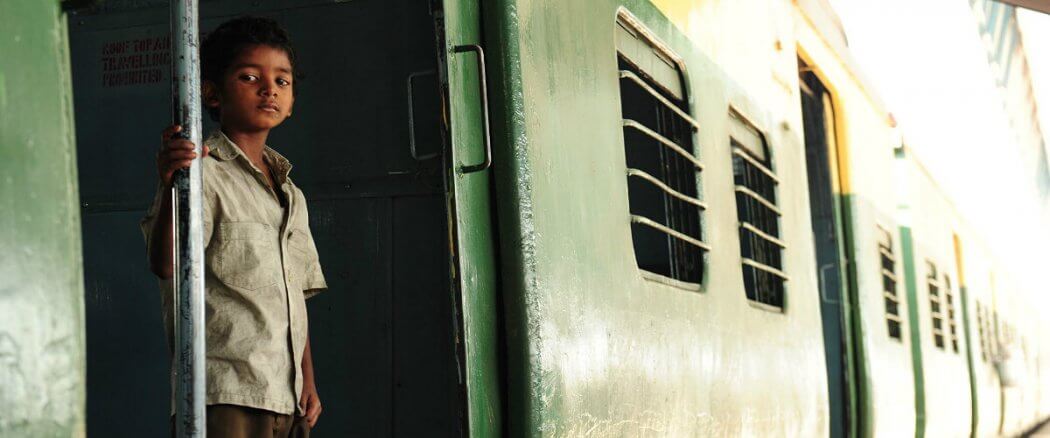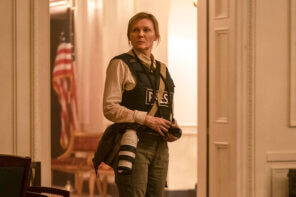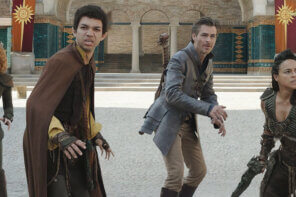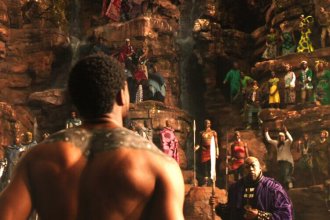Have you as a child been lost — even for 5 or 10 minutes? How about being lost when you were 5 years old? How about being lost at 5 years old and being uneducated — not even knowing your address nor the name of your home town? How about becoming lost riding on a train and ending up in a city of 10 million people almost 1000 miles from your home, where you do not speak their language? In fact, you are so uneducated that you get your first name wrong. In addition you avoid police because the 5 years you have lived were spent as a beggar and thief in order to eat and your experience was that police arrested and beat you? What would your chances be for survival in a huge city where there are thousands of children on the streets and hundreds of adults who prey on them? Those children are like you, but they speak the city’s language and know the layout. What would your chances be of surviving? And if you did survive and were adopted to a far-away country, how likely is it that you could 25 years later find your original home and family? This is the basis of the truly amazing story of Saroo Brierley told in the film Lion, based on his best-selling book “A Long Way Home: A Memoir.”
From Impoverished to Alone in this World
The film opens beautifully with Saroo walking among rolling hills near his rural village of Burhanpur — the sun shining golden on hundreds of butterflies which flit by him. His older brother, Guddu, calls to him from a rise in the distance and he runs to him with the hyperkinetic joy and excitement that 5-year-old boys exhibit. Born into a family whose father abandoned him along with his mother and 3 siblings, Saroo spends most of the first 5 years of his life impoverished and constantly hungry. Food is important to him and he looks with lust at many delicacies — especially the fried, sweet treats called jalebis that are sold by street vendors at a price far beyond his means. Their beautiful mother is loving but will often be gone for days at a time working at the only job she can find — moving rocks for construction companies. When she is gone it is up to Saroo to take care of his youngest sister, two-and-a-half-year-old Shekila, while Guddu goes from one rail station to another to find scraps of food or even dropped change. And when his mother is home, Saroo goes on adventures with Guddu where they gather scattered pieces of coal or other objects of minimal value hoping to be able to barter the collected items for staples like milk.
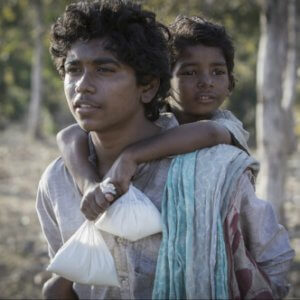 Saroo (played adorably by Sunny Pawar in his film debut) idolizes Guddu, who is clearly his father figure. And paradoxically it is because of that unbridled admiration for his brother that Saroo finds himself alone, locked in an empty coach car of a train hurtling to an unknown destination. Without food and water for 36 or more hours (it is unclear because he was initially sleeping which causes him to lose track of time), and unable to know where or even what direction he is going, Saroo finally flees the coach car when it is opened to debark in one of the world’s busiest train stations in Kolkata (then Calcutta). Once free of his “prison” Saroo wanders the streets, forlornly calling for “mum” and Guddu. He stays alive by his wits — sleeping on cardboard and cleverly escaping sexual predators, slavers, or those who would murder him for his organs.
Saroo (played adorably by Sunny Pawar in his film debut) idolizes Guddu, who is clearly his father figure. And paradoxically it is because of that unbridled admiration for his brother that Saroo finds himself alone, locked in an empty coach car of a train hurtling to an unknown destination. Without food and water for 36 or more hours (it is unclear because he was initially sleeping which causes him to lose track of time), and unable to know where or even what direction he is going, Saroo finally flees the coach car when it is opened to debark in one of the world’s busiest train stations in Kolkata (then Calcutta). Once free of his “prison” Saroo wanders the streets, forlornly calling for “mum” and Guddu. He stays alive by his wits — sleeping on cardboard and cleverly escaping sexual predators, slavers, or those who would murder him for his organs.
Salvation for Saroo comes by the hands of several acts of grace from strangers (scattered among many uncaring or even evil ones). After surviving dreadful conditions in the Liluah Juvenile Home for orphaned street “throw-aways,” Saroo has the great fortune to be chosen by the kind Mrs. Sood to go to her orphanage where she and her staff are actually interested in his welfare. Eventually adopted by John and Susan Brierley from Tasmania off the coast of Australia, he enters a previously unimaginable life of relative affluence and opportunity. He becomes Australian in accent and manner, doing well in school and his social life.
Needle in a Haystack
The adult Saroo (wonderfully acted by Dev Patel of Slumdog Millionaire and the Exotic Hotel movies) seems well adjusted but still, almost subliminally, retains that 5-year-old boy’s memories with amazing accuracy. Before falling asleep he routinely tries to send his birth family a psychic message that he is well. But the memories remain dormant until one day as a young man, while socializing with mostly Indian friends, he goes to their kitchen and sees a pan of sweet jalebis frying, which causes him to have an epiphany. Memories of his childhood flood back. He says “I’m starting to remember… a life I’d forgotten.” And Saroo undertakes the life-mission of finding his hometown and his family. “I had another family — a mother… a brother. I can still see their faces. I have to find my way back home. I don’t have a choice.”
Saroo and his friends initially think this will not be that difficult a task, but as time goes on they begin to grasp the enormity of finding one small rural train station and village among the tens of thousands in the vast Indian countryside, especially since the name of the village and its direction and distance from Kolkata is uncertain. Saroo eventually is introduced to Google Earth and then becomes obsessed with using that tool for his search, spending almost his every waking moment in this mission. His obsession interferes with his relationships with his parents and adopted brother, especially in that he is afraid to be completely honest about his need to find his biologic family. As Saroo says in his book, “Adoptees, whether or not they ever knew their birth parents, often describe the constant, gnawing feeling of there being something missing: without a connection, or at least the knowledge of where they are from, they feel incomplete.”
Unknown Actors with the Pros
Six year old Sunny Pawar is unbelievably convincing and skilled as the young Saroo. His desperate scenes while on the locked coach are truly heartbreaking. Considering that, not speaking any English, he could not communicate with the other actors when he started the film, Sunny’s accomplishments in this film are astounding. But Dev Patel steals the acting plaudits for this film. Patel has already been recognized for his achievements with numerous award nominations and an Oscar bid. The fabulous Nicole Kidman (winner of an Oscar for The Hours and nominated for Moulin Rouge! and Rabbit Hole, not to mention my personal favorite Dead Calm) as Sue Brierley has a relatively small but effective supporting role. Kidman has said the part is her in that she is in real life an Australian who has adopted two children and loves them “unconditionally.” Abhishek Bharate, also in his acting debut, is hauntingly memorable as Guddu. Rooney Mara (Oscar nominated for Carol and The Girl with the Dragon Tattoo) plays Saroo’s girlfriend Lucy (the role is actually based on a composite of several from the book). Her under-developed role is mostly wasted and frustrating for the viewers.
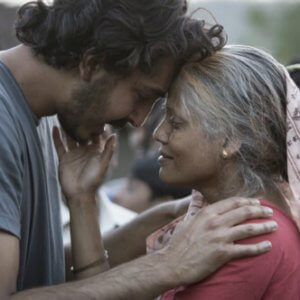 Fortunately for Sunny Pawar the beginning of this film has very sparse dialogue, so his language skills, or lack thereof, were not an issue. Director Garth Davis (until now mainly known for co-directing the Australian TV mystery miniseries Top of the Lake) makes that and other impressive choices in presenting the biopic — choices not necessarily suggested by the book. The conclusion, especially, is well-done. I did not find the film to be annoyingly melodramatic as some reviews have stated. The final scenes are filled with earned, but not maudlin, emotion. It is remarkable that in the last third of the movie when Saroo returns to India, Davis uses natives rather than hired extras to surround Saroo’s “found” family. The smiles and joy on the faces of the surrounding throngs seemed noticeably genuine. And the cinematography of Greig Fraser (Rogue One, Foxcatcher and Zero Dark Thirty) is striking. The scenes of the crowding and poverty of India are contrasted with its natural beauty. The film’s opening and closing scenes are stunning. And there is a long-shot of two coal locomotives speeding past each other on a bridge at night which is nothing short of awesome.
Fortunately for Sunny Pawar the beginning of this film has very sparse dialogue, so his language skills, or lack thereof, were not an issue. Director Garth Davis (until now mainly known for co-directing the Australian TV mystery miniseries Top of the Lake) makes that and other impressive choices in presenting the biopic — choices not necessarily suggested by the book. The conclusion, especially, is well-done. I did not find the film to be annoyingly melodramatic as some reviews have stated. The final scenes are filled with earned, but not maudlin, emotion. It is remarkable that in the last third of the movie when Saroo returns to India, Davis uses natives rather than hired extras to surround Saroo’s “found” family. The smiles and joy on the faces of the surrounding throngs seemed noticeably genuine. And the cinematography of Greig Fraser (Rogue One, Foxcatcher and Zero Dark Thirty) is striking. The scenes of the crowding and poverty of India are contrasted with its natural beauty. The film’s opening and closing scenes are stunning. And there is a long-shot of two coal locomotives speeding past each other on a bridge at night which is nothing short of awesome.
The Rare Film That Is Better Than the Book
The film to me is actually superior to the book, which like many biographies gets bogged down in too much less-interesting detail. While leaving out some stories that I thought were fascinating (such as Saroo being saved from drowning in the huge Hooghly River in Kolkata twice by the same old beggar — who cared enough to rescue the 5 year old but never said a word to him), screenwriter Luke Davies does a good job of paring down the story. Davis and Davies also make more vivid than the book to me the frustration and obsession that became Saroo’s use of Google Earth to keep looking… keep looking despite so many nights, months and years of dead-ends and failures. My only puzzle as to the screenplay is why Davies gave the Rooney Mara character of Saroo’s girlfriend such prominence (more than in the book) yet left it hanging with no closure.
Many Themes
The issues that could possibly come to the forefront in this film are multiple, and like most films the one that resonates may depend on where you are in your life-walk. There is the main theme of the incompleteness of someone who does not know the status of their origins… someone who has been “lost” for 25 years. There is the theme of philial love of Saroo’s true siblings but also of his love for his fellow street strays. (There are estimated to be 100,000 on Kolkata’s streets this day — most destined to terrible futures. See here if you want to change that in a small way.) There is the guilt of being a survivor when so many others succumb to the dangers… of being so incredibly blessed when so many are not.
 There is the incomparable love of a mother who for 25 years would not move far from her home (despite the urging of her children and friends) because she had undying certainty that her lost son would return (in this case a good thing but, considering the odds, is it always?). There is Saroo’s guilt (and all of ours as well) at living a life of affluence while his mother and siblings were left in poverty. There is the generosity of being an adoptive parent and then being able to be happy for a child’s passion to find his biological parent. Susan Brierley tells Saroo, when he finally confesses to them that he has been searching for his birth family, “From the moment you came to into our lives, you were all we could hope for… no, more than we could ever hope for.” God bless adoptive parents.
There is the incomparable love of a mother who for 25 years would not move far from her home (despite the urging of her children and friends) because she had undying certainty that her lost son would return (in this case a good thing but, considering the odds, is it always?). There is Saroo’s guilt (and all of ours as well) at living a life of affluence while his mother and siblings were left in poverty. There is the generosity of being an adoptive parent and then being able to be happy for a child’s passion to find his biological parent. Susan Brierley tells Saroo, when he finally confesses to them that he has been searching for his birth family, “From the moment you came to into our lives, you were all we could hope for… no, more than we could ever hope for.” God bless adoptive parents.
Finally there is the theme that spoke most to me… that of Saroo’s never ending determination to continue what many deem a hopeless quest. As Lucy screams at Saroo in frustration “You need to face reality!” But there are issues in all of our lives that seem hopeless… that we are encouraged to give up or, perhaps, we tell ourselves that we should “face reality.” How do we know when to hang on and persevere, like Saroo? For those of us with faith, we need to listen to that “still, small voice” (not the great wind, not the powerful earthquake, not the roaring fire — 1 Kings 19:11-13). When I struggle with discouragement I will meditate on, among others, Saroo Brierley.
A Story Worth Telling
Saroo’s story has been the subject of both the Australian and American versions of “60 Minutes” and you can see the Australian version here. It does re-enact portions of Saroo’s story but — when compared to his written memoir — it contains several factual errors. Lion does a much more accurate and artful job. The actual scenes of his birth and biological mother meeting (which are also seen in the credits of Lion) are joyfully tear-inducing.
Lost for 25 years. And able to bring it to the pages and the screen. Saroo, who found out he was mispronouncing his actual name of “Sheru,” which is Hindi for “lion,” found his mother and fulfilled his quest. Saroo says in the film, prior to the completion of his journey, “Every night I imagine that I’m walking my streets home. And I know every single step of the way.” And when he finds his mother, he visualizes “I whisper in her ear ‘I’m here.'”
And he did. What a wonderful story and an even better film.

